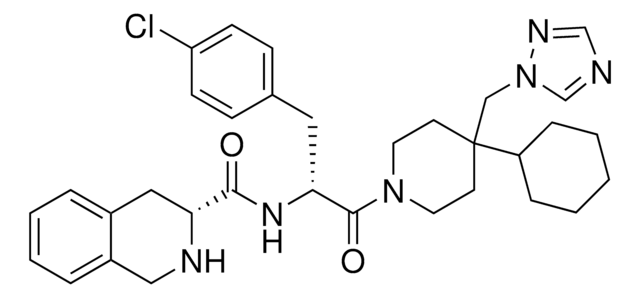T13005
1,2,3,4-Tetrahydroisoquinoline
95%
Synonyme(s) :
1,2,3,4-Tetrahydro-2-azanaphthalene, 1,2,3,4-Tetrahydro-2-isoquinoline, 1,2,3,4-Tetrahydroisoquinline, 1,2,3,4-Tetrahydroisoquinoline, 3,4-Dihydro-1H-isoquinoline
About This Item
Produits recommandés
Niveau de qualité
Pureté
95%
Indice de réfraction
n20/D 1.568 (lit.)
Point d'ébullition
232-233 °C (lit.)
Pf
−30 °C (lit.)
Densité
1.064 g/mL at 25 °C (lit.)
Chaîne SMILES
C1Cc2ccccc2CN1
InChI
1S/C9H11N/c1-2-4-9-7-10-6-5-8(9)3-1/h1-4,10H,5-7H2
Clé InChI
UWYZHKAOTLEWKK-UHFFFAOYSA-N
Informations sur le gène
human ... PNMT(5409)
rat ... Adra2a(25083) , Htr1a(24473)
Vous recherchez des produits similaires ? Visite Guide de comparaison des produits
Mention d'avertissement
Danger
Mentions de danger
Classification des risques
Acute Tox. 2 Dermal - Acute Tox. 3 Oral - Acute Tox. 4 Inhalation - Aquatic Chronic 3 - Eye Dam. 1 - Skin Corr. 1B - STOT SE 2
Code de la classe de stockage
6.1A - Combustible acute toxic Cat. 1 and 2 / very toxic hazardous materials
Classe de danger pour l'eau (WGK)
WGK 3
Point d'éclair (°F)
210.2 °F - closed cup
Point d'éclair (°C)
99 °C - closed cup
Équipement de protection individuelle
Eyeshields, Gloves, type ABEK (EN14387) respirator filter
Certificats d'analyse (COA)
Recherchez un Certificats d'analyse (COA) en saisissant le numéro de lot du produit. Les numéros de lot figurent sur l'étiquette du produit après les mots "Lot" ou "Batch".
Déjà en possession de ce produit ?
Retrouvez la documentation relative aux produits que vous avez récemment achetés dans la Bibliothèque de documents.
Les clients ont également consulté
Notre équipe de scientifiques dispose d'une expérience dans tous les secteurs de la recherche, notamment en sciences de la vie, science des matériaux, synthèse chimique, chromatographie, analyse et dans de nombreux autres domaines..
Contacter notre Service technique












